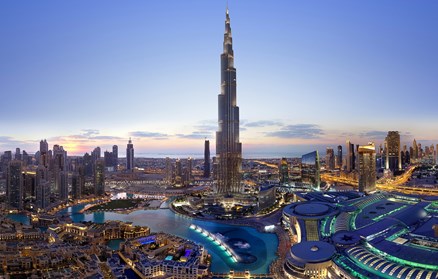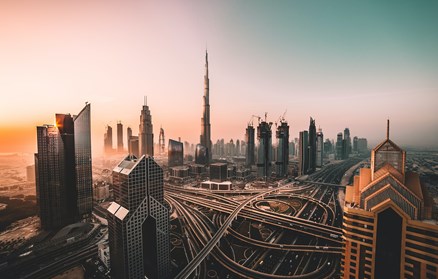LOGISTICS
Dubai is a global trade and logistics hub with a strategic location, unrivalled infrastructure, and world-class logistics facilities. The city provides the region and the world with services such as technology and innovation, trade, and logistics. The industry that plays an essential role in Dubai’s economy is that of logistics, and it constitutes over fourteen % of the UAE’s Gross Domestic Product with the sector foreseeing a growth of 4 percent between now and 2022.
Through significant investments in transport infrastructure and logistics capabilities, Dubai has become a major regional trade gateway and a re-export hub between East and West. The Dubai Government’s collaboration with the private sector helps to accelerate opportunities for global trade by implementing policies to make supply chain operations more efficient across the UAE and the world.
Its low logistics costs and advanced infrastructure have led to massive foreign investment and, from its world-class international port and airports, to its hyper-modern roads and public transportation network, Dubai is the region’s most efficient, viable and profitable logistics hub.
A Supply Chain Nerve Centre
Adding to its remarkable connectivity structure, in the last couple of years, Dubai has shifted from a logistics center into an essential supply network. Continuous large infrastructure investments have strengthened the logistics ecosystem improving global connectivity with multi modal logistics facilities, logistics process digitalisation and warehouse automation. Dubai’s integrated Free Zones capitalize on an increase in demand for a sea-air combination for freight movement and the ease of trade facilitation, coupled with technology adoption and availability of qualified resources help to make sure that Dubai is a preferred regional supply chain and distribution gateway. As part of the Dubai 2021 plan, the city intends to become one of the top five logistics centres in the world.
By Air
Dubai is easily accessible through two international airports – Dubai International Airport (DXB) and Al Maktoum International Airport at Dubai World Central (DWC). Centrally located on the global map, the city is within a 4-hour flight of one-third of the world’s population, and an 8-hour flight of two-thirds of the world’s population.
Dubai International Airport retained its position as the world's busiest hub for international passengers for the sixth consecutive year in 2019 and, together with Al Maktoum International Airport, carried over eighty-eight million travelers and over three million tons of air cargo. Al Maktoum International Airport is close to the Dubai Expo 2020 site and, when complete, is expected to have a capacity of 160 million passengers and 12 million tonnes of cargo annually.
Dubai continues to lead the region in terms of numbers of arrivals with 16.73 million international arrivals in 2019, and with 140 Airlines flying to 260 destinations direct from Dubai on over 8,000 weekly flights, underlines its status as the fourth most visited city in the world.
By Sea
Known for its world-class maritime capabilities, Dubai is one of the Top 5 shipping hubs in the world according to the International Shipping Centre Development Index in 2020. The heart of Dubai’s sea logistics operations is Jebel Ali Port, the largest marine terminal in the Middle East. Operated by DP World, the flagship facility has served efficiently as the commercial gateway to the GCC, Iran, India, Pakistan, East Africa and the Levant for over 50 years. It represents the tenth biggest container port in the world, and undoubtedly the most active harbor in the Middle East with over fourteen million TEU (Twenty-foot Equivalent Units) handled in 2019 alone.
The port is seamlessly integrated into the Free Zone and custom bonded road, rail and air infrastructure of Dubai and offers immediate logistical access to a market of more than t2 billion individuals over the Middle East, Africa and South Asian (MEASA). DP World itself is one of the world’s largest trade enablers, operating 78 terminals in 40 countries across six continents.
World Logistics Passport
As part of the Dubai Silk Road initiative, the recently-launched World Logistics Passport is designed to encourage trade through Dubai in return for enhanced custom clearances, cost and time savings to make moving goods more efficient. It enables partners to leverage DP World’s existing network of ports and economic parks, Emirates Group’s worldwide Dnata and SkyCargo network, and Dubai’s expertise in Customs and trade governance. A pilot project in operation since July 2019 has already increased trade by participants by 10 percent.
Jebel Ali Free Zone (Jafza)
Jebel Ali Free Zone (Jafza) is a core part of Dubai’s logistics revolution over the past six decades. In the last 35 years, Jafza has grown from 19 companies in 1985, to more than 8,000 today, which includes nearly 100 Global Fortune 500 enterprises, most of which have chosen the Free Zone for their regional headquarters to serve the wider Middle East region. As an integral part of DP World, Jafza’s vision is ‘To Lead the Future of World Trade’ and establish Dubai as a global trading hub.
It is the first and largest Free Zone in Dubai and the most efficient one-stop platform for industrial and logistics solutions. A logistics hub for the Arabian gulf, Jafza provides sea connectivity with over 80 weekly services to more than 150 direct ports of call and more than 180 shipping lines. Jafza, along with Jebel Ali Port, combines unparalleled access by sea, air and land with a multitude of modern facilities, a wide choice of logistics service providers and excellent connections with the hinterland. Any business associated with Jafza has an opportunity to tap into markets of over 3.5 billion consumers.
Dubai South
Offering smart services in line with Smart Dubai 2021 strategy, Dubai South’s Logistics District was established to bridge the gap in the global supply chain system. The District boasts a dedicated state-of-the-art airport-seaport corridor, allowing cargo to be moved from port to airport in just 20 minutes. Besides offering seamless connection through land, sea, and air on a global scale, it also provides progressive infrastructure that is able of handling the smooth flow of goods, products, and services for contract logistics, integrators, freight forwarders, agents and traders. The District also provides warehousing solutions that facilitate flexible storage. These solutions also include:
-
Shared warehouses with flexibility to sub-divide and combine units
-
Purpose-built warehouses from 2,500 to 5,000 m²
-
Built-to-suit solutions
-
Plot leasing plans







